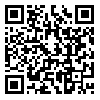BibTeX | RIS | EndNote | Medlars | ProCite | Reference Manager | RefWorks
Send citation to:
URL: http://journal.zums.ac.ir/article-1-5053-fa.html


 ، فرهاد طارمیان*2
، فرهاد طارمیان*2 

 ، نیما معتمد1
، نیما معتمد1 

2- گروه روانشناسی بالینی، مرکز تحقیقات سوء مصرف و وابستگی به مواد، دانشگاه علوم بهزیستی و توانبخشی، تهران ،
Background and Objective: Delinquent behavior of adolescents is one of the major concerns of societies, families and social institutions. Therefore, a comprehensive and multi-component analysis of this issue can lead to effective interventions. This study was an effort to find the relationship of personality factors, emotion regulation, antisocial cognition, mental health, and life fields in juvenile delinquency behaviors.
Materials and Methods: In this descriptive cross-sectional and correlational study, 394 male high school students in Zanjan, from the second, third and fourth grades were selected using the cluster sampling in the academic year 2015-2016. Data were collected using Neo Personality Questionnaire, Grass & John Emotion Scale, Mental Health Questionnaire, Singer Family Scale, Collaborating with criminal Peers by Pascal Grossmic Self-Control Questionnaire, Scale Otting school satisfaction, Walter’s antitrust cognitive questionnaire, Iranian adolescent risk taking questionnaire and delinquent behavior questionnaire and analyzed using the Pearson correlation coefficient and multiple regression.
Results: The results of the multiple regression showed that delinquent behaviors had a positive and significant relationship with self-control variables (P <0.001), delinquent peers (P <0.001), antisocial cognition (P <0.001)(P = 0.44), while the relationship with family monitoring (P = 0.006) and conscientiousness (P = 0.003) was negative and significant.
Conclusion: Delinquent peers, self-control, antisocial cognition, family monitoring, conscientiousness, and neuroticism have independent relationship with juvenile delinquency behaviors.
دریافت: 1396/11/16 | پذیرش: 1396/11/16 | انتشار: 1396/11/16
| بازنشر اطلاعات | |
 |
این مقاله تحت شرایط Creative Commons Attribution-NonCommercial 4.0 International License قابل بازنشر است. |


